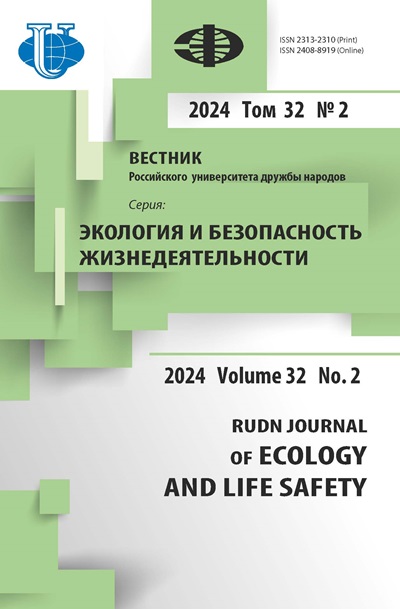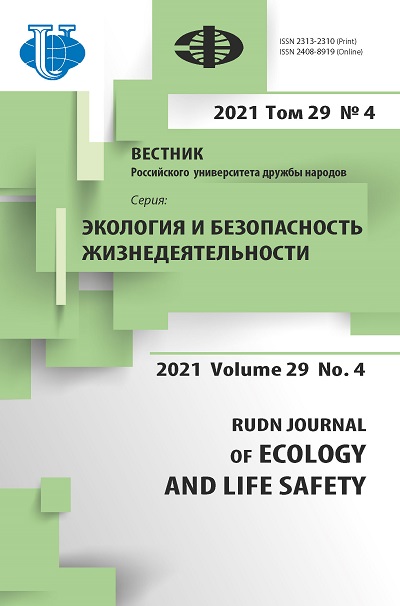Оценка современного состояния окружающей среды - изменения 2022
- Авторы: Ледащева Т.Н.1, Пинаев В.Е.1,2
-
Учреждения:
- Российский университет дружбы народов
- Экологическая консалтинговая компания ООО «ФРЭКОМ»
- Выпуск: Том 29, № 4 (2021)
- Страницы: 381-385
- Раздел: Экологическое образование
- URL: https://journals.rudn.ru/ecology/article/view/30867
- DOI: https://doi.org/10.22363/2313-2310-2021-29-4-381-385
Цитировать
Полный текст
Аннотация
Рассматриваются изменения требований законодательства Российской Федерации по оценке современного состояния окружающей среды, проводимой в рамках инженерно-экологических изысканий, и требования к подготовке проектной документации в части оценки воздействия на окружающую среду. Учет обновленных требований законодательства важен не только при подготовке проектной документации - оценки воздействия на окружающую среду и перечня мероприятий по охране окружающей среды, но и при подготовке специалистов-экологов. Важно, чтобы выпускник был в курсе требований законодательства и понимал, что законодательство подвержено изменениям.
Об авторах
Татьяна Николаевна Ледащева
Российский университет дружбы народов
Email: ledashcheva-tn@rudn.ru
кандидат физико-математических наук, доцент, департамент экологической безопасности и менеджмента качества продукции, Институт экологии Российская Федерация, 117198, Москва, ул. Миклухо-Маклая, д. 6
Владимир Евгеньевич Пинаев
Российский университет дружбы народов; Экологическая консалтинговая компания ООО «ФРЭКОМ»
Автор, ответственный за переписку.
Email: pinaev-ve@rudn.ru
ORCID iD: 0000-0001-8943-5462
кандидат экономических наук, доцент, департамент экологической безопасности и менеджмента качества продукции, Институт экологии, Российский университет дружбы народов; главный специалист, экологическая консалтинговая компания ООО «ФРЭКОМ»
Российская Федерация, 117198, Москва, ул. Миклухо-Маклая, д. 6; Российская Федерация, 119435, Москва, ул. Малая Пироговская, д. 18, стр. 1Список литературы
- Ледащева Т.Н., Пинаев В.Е. Обзор зарубежных публикаций по вопросам оценки современного состояния окружающей среды и оценки воздействия на окружающую среду // Науковедение. 2017. Т. 9. № 1. С. 1–10. URL: http://naukovedenie.ru/PDF/16EVN117.pdf (дата обращения: 12.12.2021).
- Пинаев В.Е., Михеева А.И. Оценка отходов и накопленного экологического ущерба по материалам дистанционного зондирования Земли при проведении оценки современного состояния окружающей среды // Науковедение. 2017. Т. 9. № 1. С. 1–10. URL: http://naukovedenie.ru/PDF/17EVN117.pdf (дата обращения: 23.12.2021).
- Евстропов В.М. Cовременная методология оценки загрязнения окружающей среды // Заметки ученого. 2019. № 9 (43). С. 61–64.
- Смиренникова Е.В., Уханова А.В., Воронина Л.В. Оценка состояния окружающей среды и обеспечения экологической безопасности в российской Арктике // Управленческое консультирование. 2018. № 9 (117). С. 59–78.
- Куликов Р.Н. Экологическая оценка состояния окружающей среды на территории Западно-Эргинского месторождения на этапе изысканий // Доклады Башкирского университета. 2018. Т. 3. № 2. С. 177–182.
- Дикинов А.Х., Цороева М.И. Управление процессами развития и оценка состояния окружающей среды в районах функционирования объектов энергетики // Управленческий учет. 2021. № 6–1. С. 26–32.
- Липина Л.Н., Усиков В.И. Использование геоинформационных технологий для оценки и прогноза состояния окружающей среды // Горный информационно-аналитический бюллетень (научно-технический журнал). 2018. № 8. С. 46–53.
- Слонская Е.А., Сергеенко К.В., Дембовская В.В. Оценка экологического состояния окружающей среды на территории памятника природы областного значения Mарковские горы // Вестник современных исследований. 2018. № 8.1 (23). С. 28–31.
- Жаворонкова Н.Г., Агафонов В.Б. Анализ и оценка современных проблем законодательства Российской Федерации в сфере охраны окружающей среды при пользовании недрами // Минеральные ресурсы России. Экономика и управление. 2020. № 3 (172). С. 65–68.
- Кануков А.С., Корбесова К.В. Cовременные методы и подходы к оценке уровня загрязнения окружающей среды // Труды Института геологии Дагестанского научного центра РАН. 2021. № 2 (85). С. 61–68.
















